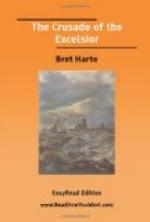The plateau on which they stood seemed to drop suddenly away, leaving them on the rocky shore of a monotonous and far-stretching sea of waste and glittering sand. Not a vestige nor trace of vegetation could be seen, except an occasional ridge of straggling pallid bushes, raised in hideous simulation of the broken crest of a ghostly wave. On either side, as far as the eye could reach, the hollow empty vision extended—the interminable desert stretched and panted before them.
“It’s the jumping-off place, I reckon,” said Crosby, “and they’ve brought us here to show us how small is our chance of getting away. But,” he added, turning towards the plateau again, “what are they doing now? ’Pon my soul! I believe they’re going off—and leaving us.”
The others turned as he spoke. It was true. The dragoons were coolly galloping off the way they came, taking with them the horses the Americans had just ridden.
“I call that cool,” said Crosby. “It looks deuced like as if we were to be left here to graze, like cattle.”
“Perhaps that’s their idea of a prison in this country,” said Banks. “There’s certainly no chance of our breaking jail in that direction,” he added, pointing to the desert; “and we can’t follow them without horses.”
“And I dare say they’ve guarded the pass in the road lower down,” said Winslow.
“We ought to be able to hold our own here until night,” said Brace, “and then make a dash into Todos Santos, get hold of some arms, and join the ladies.”
“The women are all right,” said Crosby impatiently, “and are better treated than if we were with them. Suppose, instead of maundering over them, we reconnoitre and see what we can do here. I’m getting devilishly hungry; they can’t mean to starve us, and if they do, I don’t intend to be starved as long as there is anything to be had by buying or stealing. Come along. There’s sure to be fruit near that old chapel, and I saw some chickens in the bush near those huts. First, let’s see if there’s any one about. I don’t see a soul.”
The little plateau, indeed, seemed deserted. In vain they shouted; their voices were lost in the echoless air. They examined one by one the few thatched huts: they were open, contained one or two rude articles of furniture—a bed, a bench, and table—were scrupulously clean—and empty. They next inspected the chapel; it was tawdry and barbaric in ornament, but the candlesticks and crucifix and the basin for holy water were of heavily beaten silver. The same thought crossed their minds—the abandoned mine at the roadside!




